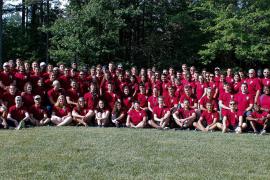For the past 27 years, I have had the profound honor of serving as the CEO and cofounder of The Redwoods Group — a mission-driven insurance company.
We were created to prevent kids from being sexual abused. And we’ve since expanded that mission to include advocacy on drowning prevention, zip line safety, and working to prevent any number of ways that kids get harmed.
I’m proud of the work we do. But what’s important to note is that every skill I use, everything I do — it was all fostered at camp.
Summer after summer, I would spend weeks out at Camp O-At-Ka on the shores of Lake Sebago in Southern Maine. And while I learned my fair share about hard work at O-At-Ka, I was mostly oblivious to the sheer amount of hard work and dedication it takes to keep camp running.
All of us campers were.
But the veil has been lifted, through my own experience as a camp counselor, my kids' experiences in the same role, and because I and my Redwoods’ team members get to hear from camps across the country. Not just about the magic of camp, but the hard, unvarnished reality too. We get to talk and visit with you, the camp community. And we get to hear about what you are struggling with from one season to the next.
Increasingly, there is one thing we hear above all others:
“I can’t recruit enough quality staff.”
Recruitment Shortfalls Meet Supervision Challenges
Now, we know that in a tight labor market, recruitment is a challenge across industries. But from what we’re hearing from our customers, it’s especially challenging for camps. Here’s why:
- Firstly, the continued fallout from the pandemic means it takes more staff to supervise the same number of children.
- Secondly, camps are still finding it hard to compete against paid internships and other ‘career-building’ opportunities. (This seems to be a particular challenge in terms of retaining more experienced counselors year-after-year.)
It’s clear that we need to think hard about how we can compete for young hearts and minds who are hearing from almost every angle that they have to focus on their career, buckle down, do that internship, and get a “real job.”
Luckily, from my CEO perspective, camp counselor is about as real a job as I can imagine. And I know that as a dad too.
The Deep Value of Camp Experience
I’ve been blessed to raise three wonderful children, the last of whom are just starting out on their careers. I’ve watched them graduate from college. I’ve watched them tackle internships and job placements. And I’ve watched them come home exhausted, a little smelly, and exuberantly happy from camp as campers, as CITs, and — for two of them — as counselors.
I can tell you right now that those times at camp were some of the most valuable, and formative, weeks of their lives.
Specifically, what struck me from their experiences, and what I have seen time and time again when hiring as a CEO, is how perfectly camp skills line up with the demands of the flexible, modern workplace. Whether it’s discipline or flexibility, empathy or problem-solving, camp counselors come home with a toolbox of strengths that position them well for their future.
Soft Skills Are Hard Currency
My daughter, Mallory, learned the hard way when she was a CIT during the height of a norovirus outbreak. Barely two weeks in and Abby, her senior counselor, was suddenly out of the picture. So were four of her campers. And much of the rest of the camp was struggling too. In other words, she was suddenly out of ratio, dealing with an unexpected situation, and having to figure out how to keep kids entertained, safe, healthy, and comfortable.
And yet, Mallory thrived. She used her creativity, her empathy, her communication, and her problem-solving skills to adapt to the situation she was facing. And she learned first-hand what it means to innovate out of a culture of discipline.
Of course, many of these skills are what are incorrectly referred to as “soft skills.” Yet those “soft” skills are actually the essential skills that set candidates apart in an age of Chat GPT and remote work.
In 2017, North Carolina Governor Roy Cooper asked me to chair NCWorks — our state’s Workforce Development Program. And as part of that work, I helped to set up a career development program called the Furniture Academy. Here’s what the CEO of Lexington Home Brands told me when I asked him how much furniture experience a candidate might need:
“I can teach you how to make furniture. But what I can’t teach you is the character traits or values it takes to succeed. I need you to get to work on time. I need you to do the work we ask you to do. And I need you to get along with the people we’ve asked you to work with.”
A second CEO happened to be listening, and he shared that he had fired many people over the course of his long career. Looking back on those firings, he said he could not think of a single time when it hadn’t been related to one of those three things.
And every single one of those things is an essential skill that is learned at camp.
CEOs Are Already Sold on Camp
Every now and then I will hear from a child, or their parents, about how they’d love to be a camp counselor, but it just doesn’t fit with their career path. They need something "marketable" on their resume. And every time, I’m both amused and confused by this misconception.
If there’s one thing I know about CEOs, it’s that CEOs really value camp. I certainly do.
In all honesty, "camp counselor" is one of the first things I look for on a resume. That’s because I am a firm believer in hiring for heart. And I am very far from alone.
When I spend time with CEOs and other business leaders, what I am struck by is that a disproportionate number of them have been campers and camp counselors themselves. They know and understand what camp can teach a kid because camp is a formative part of what made them successful in their careers. The problem, then, is not selling CEOs on the value of camp. The problem is convincing a kid who is desperate to get hired, or their parents, of the fact that CEOs will deeply value their time spent at camp.
I have been inspired and astounded by ACA’s Project Real Job. The recruitment tools and resources make a powerful and compelling case for camp as a solid career move. In order for those resources to work to their fullest, however, it’s important that the reality of camp matches the promise of your marketing and recruitment materials:
- That means providing an intentional and experiential curriculum of leadership development to help staff process and embrace the lessons they learn in every camp day
- It means making sure that counselors and parents understand the transferrable nature of the skills they are learning
- It means setting aside time to provide career development advice, mock interviews, or activities — or inviting people like me (many of who are your own camp alumni or camper parents) to camp to help provide outside validation for the skills they are learning
- It should include mentoring or listening sessions, taking the time to understand your team’s career goals so you can tailor the ways you support them
- And it absolutely means checking in with your counselors during the off-season, staying in touch, and proactively offering to make yourself available as a reference
Ideally, what we are talking about here is creating a camp-wide culture of leadership development, where it’s not just specific sessions of the camp director talking about career skills. Instead, there are conversations at every level — between directors and counselors, between senior counselors and junior counselors, and with campers too — where we intentionally reflect on and learn to articulate the skills that we have learned.
The Ultimate Internship
The world of work is almost unrecognizable since I started my career back in 1979. And I have tried, as a CEO, to keep up-to-date with new ways to offer career development to our staff. Yet there are limits to how much we can do, because the only constant is a constant state of change.
This is why the experience you offer, as camps, is so important. It prepares young people for the constancy of change. It builds the essential skills and values required to navigate a dynamic environment of constantly shifting priorities and demands, pressures, and opportunities.
To the entire camp community, let me take this opportunity to say thank you for all you do to prepare young people for the workplace of tomorrow. As a CEO, employer, and a parent, I can tell you that you have made my life a little easier, and a whole lot more rewarding.
Kevin A. Trapani has been CEO of The Redwoods Group since its inception in 1997, and previously served as Executive Vice President of Burlington Insurance Group. A 1979 Duke University graduate with a bachelor’s degree in political science, Kevin is a regular speaker at Duke University’s Hart Center for Ethical Leadership. Kevin has been named one of the 50 most influential leaders in the state of North Carolina for his deep involvement in multiple philanthropic interests and his leadership of what is broadly recognized as one of the most innovative socially conscious for-profit companies in the nation. Email: [email protected]
This blog was written on behalf of Project Real Job whose purpose is to support camps in their efforts to recruit, hire, and retain staff.
Photo courtesy of Cheley Colorado Camps in Estes Park, CO
The views and opinions expressed by contributors are their own and do not necessarily reflect the views of the American Camp Association or ACA employees.





